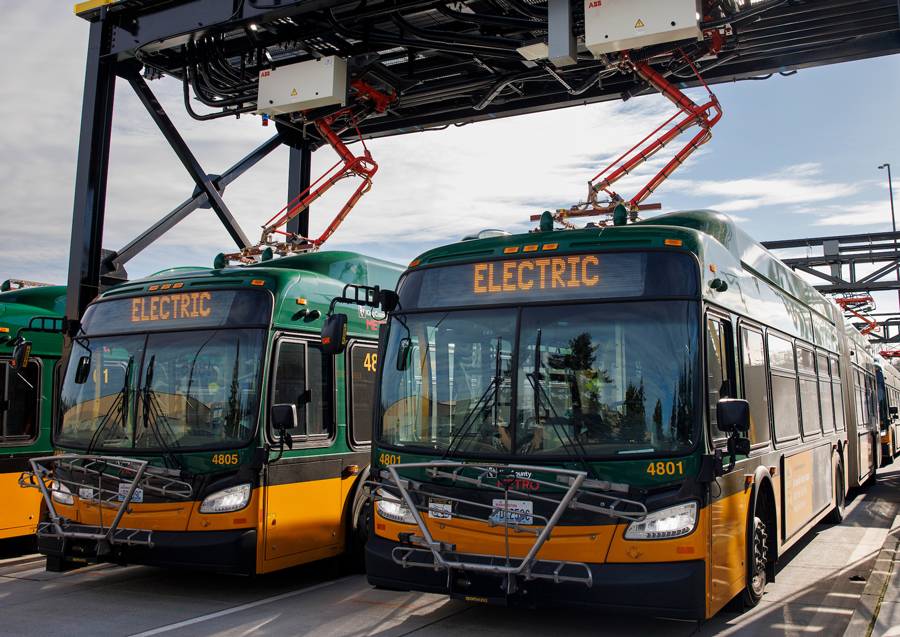
Images courtesy of King County Metro
Innovative technologies and strong partnerships drive sustainability
How King County Metro is working toward zero emissions
By Michelle Allison, General Manager | King County Metro
At King County Metro, our mission is to provide safe, clean and reliable transportation for more than 1.5 million riders each week. Sustainability and climate stewardship are deeply rooted in that mission. As the largest transit agency in the northwestern United States, we’re providing a great way to travel that isn’t a car, and we’re doing it while cutting pollution, reducing our own carbon footprint and advancing our region’s climate goals.
We are forging an ambitious and bold path forward to achieve zero emissions, a goal set by our County Executive and County Council to promote sustainability. Our journey hasn’t been simple nor direct, and Metro continues to adapt and advance – both internally as a large agency and with still-emerging technologies.
And as we have before, Metro is in a leadership position to combine our values, vision and buying power to encourage a diverse marketplace of zero emissions fleet manufacturers and suppliers. In this way, we are doing our part to help available technologies improve and proliferate, reducing pollution and benefiting transit agencies and communities across the country.
Our zero emissions program is key to our unwavering sustainability commitment. In 2004, when other transit agencies were still investing in diesel vehicles, we were the first transit agency in the nation to adopt hybrid coaches. Since then, we have invested in a low and zero emissions fleet, retired the last of our diesel-only buses, cut the ribbon on a state-of-the-art testing facility to evaluate electric buses and the infrastructure that supports these buses, and broke ground on our first fully electric vehicle base, which will serve as a model for future expansions.
These investments in technology and infrastructure, combined with strategic organization and strong partnerships on a local, regional, state and federal level, are essential as we work toward achieving our zero emissions goal.
Innovative technologies and infrastructure
Adopting and efficiently deploying new technologies drives our zero emissions strategy. We are continuing to integrate battery-electric buses into our fleet, with plans to expand significantly in the coming years. Additionally, our iconic, all-electric trolley network – Metro's original zero emissions vehicles – continues to play a crucial role in our zero emissions strategy.
Electric fleet: The 174 electric trolleys in our fleet are favorites of regular riders and those who visit . They also represent one of the largest trolley networks in the nation. We also have 40-foot and 60-foot battery electric buses from manufacturers like New Flyer and GILLIG. The first of the 89 battery electric buses purchased from GILLIG will start arriving in 2025, with plans to transition 1,400+ buses over time.
Charging infrastructure: We developed a sophisticated charging infrastructure to support our electric fleet. This includes the installation of various charging stations at our bases, such as the newly named Tukwila base. Our test facility in south King County has been instrumental in evaluating different charging technologies and configurations, helping us optimize space and improve the efficiency of our charging operations.
Standardization efforts: We are actively working with original equipment manufacturers (OEMs) and the engineering community to create standards for charging infrastructure. Metro will only adopt technology that has SAE standards, thus ensuring interoperability between buses and charging systems across our fleet.
Hydrogen and renewable diesel: While our primary focus is on battery electric buses, we also are exploring other technologies like hydrogen fuel cells and renewable diesel. We’ve deployed renewable diesel at one of our base operations—reducing over 60% of greenhouse gas (GHG) emissions immediately. Along with offering additional flexibility and potential benefits, particularly in areas where battery electric technology may face limitations, these alternatives are also a reminder that we have a responsibility to the health and sustainability of the communities we live in.
Images courtesy of King County Metro
Stronger through partnership
Procuring and deploying new technologies would not be possible without the robust partnerships we have cultivated with both private and public entities. These collaborations are essential for driving innovation and securing funding, ensuring the long-term viability of our zero emissions efforts.
Our partnerships with bus manufacturers, technology providers and engineering firms have been instrumental in advancing our electrification efforts. Companies like New Flyer and GILLIG have worked closely with us to develop and refine the battery electric buses that form the current backbone of our zero emissions fleet. These private-sector collaborations have enabled us to stay at the forefront of technological advancements and ensure that our fleet is equipped with the latest innovations.
Our collaborations with local, regional, state and federal agencies have been essential for securing the funding and regulatory support necessary for our projects. Federal Transit Administration (FTA) grants and other public funding sources have provided the financial backing needed to invest in new technologies and infrastructure. Additionally, we work closely with local jurisdictions and utility providers to align our electrification efforts with broader regional sustainability goals.
These connections aren’t only in the form of the buses, on-demand vehicles, paratransit, water taxis and other modes. These connections are also in the form of people and partners.
We also engage with academic and research institutions to leverage their expertise and stay informed about the latest developments in transit electrification. These partnerships provide us with valuable insights and data, helping us make informed decisions and continuously improve our programs.

Procuring and deploying new technologies would not be possible without the robust partnerships we have cultivated with both private and public entities. These collaborations are essential for driving innovation and securing funding, ensuring the long-term viability of our zero emissions efforts.
Organizational alignment
The integration of advanced technologies and the strength of our partnerships require sound organizational strategies and alignment across all levels of our agency.
The transition to zero emissions is a transformational change involving an emerging industry that is also developing. By definition, being a leader in this critical field means there is often not an already-established path.
All members of our organization play a role in reducing emissions and addressing climate change.
Cross-departmental Collaboration: We have established a management model that includes representation from across the agency. This ensures that every division understands its role and how it contributes to the zero emissions initiative. Facilitated conversations and transparent information distribution are central to this approach.
Systems Thinking and Change Management: Before launching our zero emissions effort, we brought in experts in systems thinking and change management to help structure our approach. This allowed us to create dedicated processes for decision-making, question-asking and information-sharing, ensuring that all parts of the organization are aligned and informed.
Data-driven Decision Making: We pride ourselves on being values-driven and data-informed. We track our progress through ambitious GHG emission goals and ridership counts. Energy audits at our facilities and the development of a fossil fuel elimination plan are key components of our strategy to achieve an 80% reduction in fossil fuel use by 2050.
Transparent Communication: Engaging with the community is a cornerstone of our strategy. We hold public forums, workshops and collaborate with local organizations to ensure that residents are informed and involved. Our targeted campaigns raise awareness about the health and environmental benefits of zero emissions transit. We also gather information from residents about how they view our priorities, ensuring that their perspectives are incorporated in strategic plans.
A cleaner, more sustainable future
The benefits of our zero emissions program are already being felt in the community. We were also intentional in prioritizing battery-electric bus investments in parts of our county that have higher levels of pollution—as well as lower income levels and a larger percentage of residents who are of color.
Today, cleaner air and quieter buses are improving the quality of life for residents. Moreover, our initiatives are creating high-tech, well-paying jobs that align with the region's values of sustainability and innovation.
Looking ahead, we remain committed to our vision of a sustainable future for public transportation. The move toward zero emissions is not just an innovation but a necessary evolution in how we deliver mobility. As we continue this journey, we are proud to lead by example, demonstrating that it is possible to provide reliable, efficient transit while taking care of our planet.
ABOUT THE AUTHOR
 Michelle Allison
Michelle Allison
General Manager
King County Metro
Michelle Allison is general manager of King County Metro. She was previously deputy general manager and is only the second woman to lead Metro. Allison joined King County in 2010 and Metro in 2017, where—prior to becoming general manager—she oversaw the agency’s bus operations, facilities, marine, rail and vehicle maintenance divisions.
